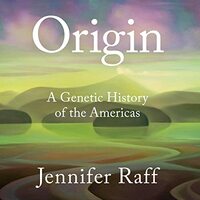Take a photo of a barcode or cover
Fascinating study of paleo-genomics and the movement of early humans into the Americas. What sets this apart is the author’s emphasis on the ethics of archaeology and the need to involve indigenous people as stakeholders in the process.
This was for work. It was cool! But again not compelled to finish. Plus I saw her give a talk on the book and that was more engaging
informative
medium-paced
informative
medium-paced
I liked how she went into how they got DNA, but she talked about it for a very long time. She also talked about tribes rights and sovereignty for a very long time, and while that’s good and all, I wanted to learn more about the genetic history of the Americas.
I was skeptical at first because this book was not written by a person of Native American heritage, and could have quickly gone down a very slippery slope. But the author seems quite respectful of indigenous peoples and their interests, and constantly reiterates the importance of viewing the topic from a native perspective. Still, I would have liked to see a Native American co-author for this book.
In the bulk of the argument, the author reminds us of the theory that people arrived in the Americas towards the end of the last ice age by way of the Bering Land Bridge. At one point she suggests that that might not be the whole story - that perhaps some people arrived further south by sea as much as 15,000 years earlier than is commonly thought, which would account for the footprints recently uncovered in White Sands National Park and similar findings. However, that theory is mentioned almost in passing and we are left wondering.
The rest of the book is a discussion of the author's own genetic research, and the colonial implications of scientific investigation of the genetic ancestry of First Nations. Perhaps that was her true purpose in writing this book - to protest unethical scientific research and support the rights of indigenous communities.
In the bulk of the argument, the author reminds us of the theory that people arrived in the Americas towards the end of the last ice age by way of the Bering Land Bridge. At one point she suggests that that might not be the whole story - that perhaps some people arrived further south by sea as much as 15,000 years earlier than is commonly thought, which would account for the footprints recently uncovered in White Sands National Park and similar findings. However, that theory is mentioned almost in passing and we are left wondering.
The rest of the book is a discussion of the author's own genetic research, and the colonial implications of scientific investigation of the genetic ancestry of First Nations. Perhaps that was her true purpose in writing this book - to protest unethical scientific research and support the rights of indigenous communities.
informative
reflective
slow-paced
informative
reflective
medium-paced
informative
reflective
challenging
informative
reflective
sad
medium-paced


